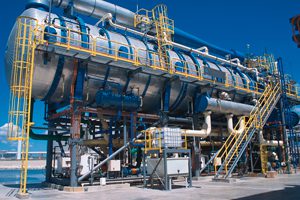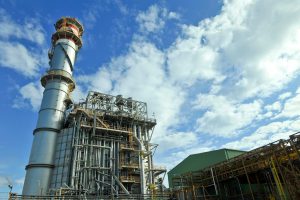Benefits of natural gas for the industrial sector
No preparation is required prior to its use as is necessary for other fuels, such as oil or coal.
Natural gas burns cleaner, so natural gas equipment and burners are easier to clean, require less maintenance and remain in good condition for longer.
Natural gas combustion may be switched off instantly when the heat demand of the devices that use it ceases. This makes it very useful for adapting to the varying operational needs of the production process.
It can be regulated with high precision, keeping temperature constant.
Natural gas has more heating power than other fuels, so equipment performs better with just the right amount of fuel.
Uses of natural gas
- Uses of gas for the industrial sector
- Uses of gas for electricity generation
- Uses of gas in transportation
Natural gas is one of the best energy sources for industries that use furnaces or boilers in their production processes, such as:
Glass industry: Natural gas’ properties have enabled the creation of burners that allow optimal heat transfer to the glass paste. Moreover, thanks to its properties, the glass comes out clean from the production process.
Ceramics industry: The use of natural gas in the ceramics industry allows for cost savings and high-quality products. This is due to the lower cost per kilowatt hour and because using natural gas decreases the formation of stains and discolouration on items during firing and drying.
Cement industry: The use of natural gas furnaces reduces maintenance, extending the useful life of the furnaces. In addition they are more efficient and contribute to reducing the environmental footprint, as the gases produced by burning it are non-polluting.
Textile industry: In the textile industry, the use of natural gas results in significant energy savings by allowing direct heating through convection instead of heating through intermediate fluids.
Food industry: Natural gas is used in cooking and drying processes. It also enables compliance with ISO quality requirements necessary for exporting certain products
Metal foundries: Natural gas is used in several processes related to heating metals, both in melting and in reheating and heat treatments.
Combined plants
A natural gas Combined Cycle Power Plant is an electricity production plant combining two processes or cycles to obtain maximum results: the Brayton cycle, where combustion gases directly power a gas turbine, and the Rankine cycle, which uses the residual energy in the exhaust heat coming from the gas turbine to generate steam in a generator, which in turn powers the steam turbine. Both machines (gas and steam turbine) drive an alternator which converts mechanical energy into electricity.
The combination of these two processes allows this type of Power Plant to have much greater energy efficiency (around 57%) than Conventional Thermal Power Stations (around 35%).
Combined Cycle Power Plants

This system is an efficient way of covering the energy needs of industrial facilities.

According to 2010 data, worldwide there are more than 11.6 million natural gas vehicles in circulation and some 17,000 service stations. In Europe in particular, Italy is the pioneer and leader in this system. There are already 700,000 vehicles in circulation in Italy and 85,000 in Germany, while in Spain the number drops to 2,900.
In Spain, vehicular natural gas is mainly used for transportation fleets of private companies, city and intercity buses, taxis, cleaning and trash collection lorries, forklifts and to a small extent in private vehicles.
What are the advantages of natural gas as a vehicle fuel?
Natural gas is the energy that provides the most benefits as a transportation fuel:
Environmental benefits
Natural gas is the alternative fuel that burns the cleanest.
Emissions from natural gas vehicles are much lower than those from vehicles that use petrol.
By unit of energy, natural gas contains less carbon than any other fossil fuel, and it therefore generates fewer carbon emissions per kilometre travelled by the vehicle.
Economic savings
The use of natural gas as a fuel compared to conventional automotive diesel allows for cost savings starting at 25% and able to reach 40% depending on the type of vehicle and the charging station. Moreover, it burns cleaner, reducing maintenance needs.
High safety level
Vehicles that run on natural gas are safer than those that use traditional fuels, as vehicular natural gas dissipates in the atmosphere in the event of an accident. Petrol, on the other hand, remains on the ground, creating a fire hazard.
